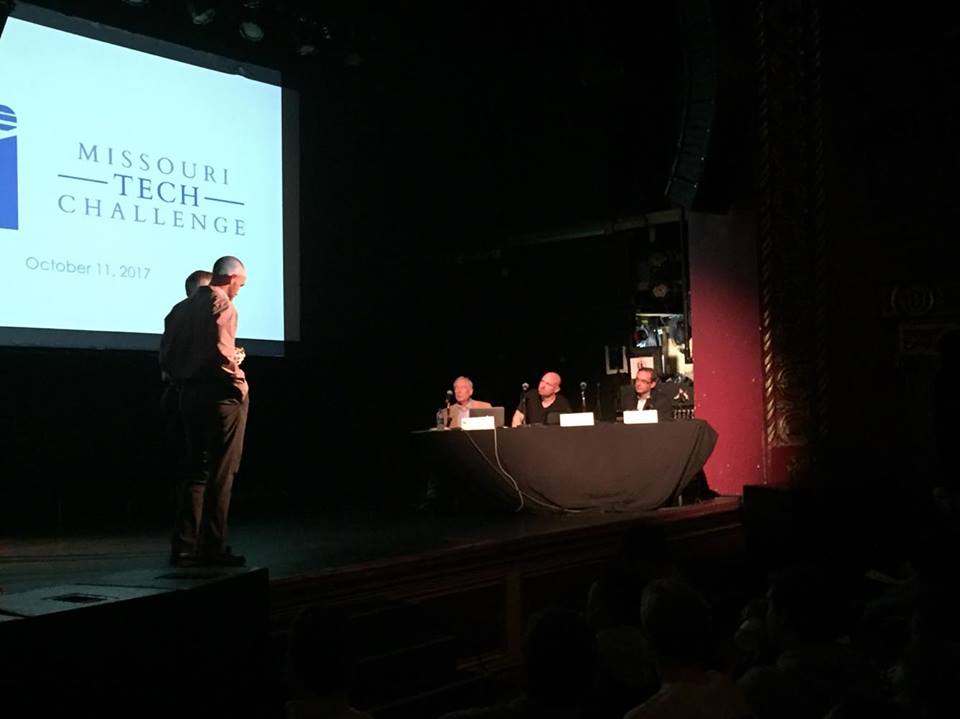At Missouri Tech Challenge, Entrepreneurs Step into the “Shark Tank”

Four Columbia startups took the stage at The Blue Note on Wednesday night, stepping into Columbia’s very own entrepreneurial “Shark Tank.”
The businesses were inaugural competitors in the Missouri Tech Challenge, a pitch competition loosely based on the ABC reality show “Shark Tank.” The startups — Ukatsu, AdSwapper, Testery, and Stor — pitched their businesses to a panel of three “shark” investors from the investment committee of the Missouri Innovation Center’s Mid-MO Tech Accelerator fund: Bill Turpin, director of MIC; Brant Bukowsky, of Veterans United Home Loans; and Jack Miller, of True Media. (The committee’s other two members, Newsy’s Jim Spencer and Carfax’s Ewin Barnett, were unable to attend.) The event was part of Bringing Up Business week, Columbia’s network of events promoting and supporting entrepreneurship in Mid-Missouri.
All the businesses were pitching for the accelerator’s standard investment package, which includes $50,000 in seed money, but, as Turpin noted in his opening remarks, nothing was guaranteed. “All of these companies could get an investment. None of these companies could get an investment,” Turpin said. “I hope this is educational. I hope everyone can see what an investment-grade presentation looks like.”
In the end, all four startups received at least some measure of support: AdSwapper and Testery received $50,000 each; Stor received $25,000; and Ukatsu got invited back to pitch to the committee again in December.
Ukatsu founders Joe Chee and Ben Brooks, the first contestants to enter the tank, are working to build a supportive community for young video gamers and promote healthy social and physical development for their members (families buy tiered membership packages for their kids). In their pitch, Ukatsu highlighted their recent contract to organize eSports competitions — competitive gaming events — for Columbia Public Schools.
AdSwapper, founded by MU’s entrepreneur-in-residence Amos Angelovici, allows users to choose which mobile ads they see on their phones and collect “points” for viewing those ads — users can then redeem those points for gift cards or other prizes. Angelovici pitched his business as “the consumer’s agent” in the digital advertising revenue chain, providing value to both consumers, who are otherwise unrewarded for their online ad-viewing, and advertisers, who can reach a more interested audience and avoid being shut out by traditional ad-blocking software.
Founder and Jefferson City resident Chris Harbert spoke for Testery, which he calls “a website that tests websites.” Using Testery, businesses can cheaply and quickly test their websites for bugs or errors. As part of the presentation, Harbert live-tested MU’s website (it passed) and recounted his decision at the beginning of August to turn down a full-time job at a Fortune 1000 company to start Testery.
MU MBA students Eric Laurent and Jake Hurrell pitched on behalf of their company Stor, a peer-to-peer platform for finding or renting storage space. They outlined Stor’s plan to launch in college towns across America, starting in Columbia in spring 2018. (Their $25,000 investment came on the condition of a verbal promise they would keep the business based in Columbia after graduating.)
The night also featured short pitches from the winners of this year’s Startup Weekend, which kicked off Bringing Up Business week last weekend. The businesses Tiki Technologies, which helps automate parking ticket appeals; Wait Time Wonder, which gives users exact wait times at restaurants; and Home Callers, which facilitates home visits by veterinary technicians, all gave one-minute pitches to the audience.
About 170 people attended the first-annual Tech Challenge event. Bringing Up Business Week continues today and Friday with more events for entrepreneurs or any other startup-minded Columbians.


